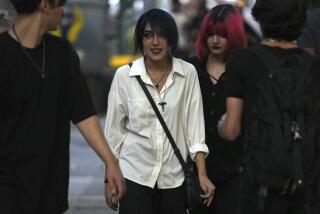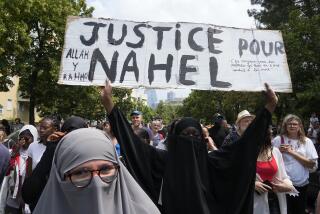In France, panel recommends a burka ban in public institutions
- Share via
Reporting from Paris — Muslim women should not be allowed to wear burkas in public institutions, including banks, post offices, schools and even on public transportation, a report by a parliamentary committee said Tuesday.
Yet the report on how to stop Muslims from wearing the full-body garment in France fell short of gathering a consensus on key questions such as whether to completely ban the burka from French streets.
How to “stop this practice is not the most simple thing to define,” the report says.
As a result, the committee reduced its recommendation to a nonbinding resolution condemning the burka as “contrary to the values of the Republic.” It also called for educational programs to reduce fundamentalism.
Andre Gerin, a member of the Communist Party and president of the committee, cautioned that the report should not “lead to a debate about religion” but instead should focus discussion on the “scandalous practices” of terrorism and extremism that “hide behind the full veil.”
Socialists on the panel worried that the burka controversy could become part of a debate over French identity and stir anti-immigrant and anti-Muslim sentiment. Committee members also strongly disagreed over whether a full ban should become law; such a recommendation was left out of the report.
Nevertheless, lawmakers could be closer to drafting a bill barring the burka in selected places to assist public servants in dealing with veiled Muslims in hospitals and schools, the report said.
The report recommends denying services to anyone in a full-body veil, but it does not advocate other punishment.
A limited ban on burkas could be legally justified, said public law expert Denys de Bechillon at France’s Pau University, because it would address “a problem of security . . . in places where we need to identify people.”
However, he said, a total ban on the burka could be ruled unconstitutional or even a rights violation.
President Nicolas Sarkozy said in June that the burka was “not welcome” in France, fueling a media frenzy.
Within weeks, the controversy “took to the French like mayonnaise,” De Bechillon said. “You mix the oil and the yolk, and at one precise moment they all congeal together. . . . It’s kind of the same story with the burka. It permitted a lot of debate on identity and . . . on the fear of Islam.”
In November, the Swiss voted in a referendum to ban construction of additional minarets in their country.
Though a majority in France say they would support an anti-burka law, a significant proportion -- 22% of respondents to a GN Research survey -- said they were “indifferent.”
The government estimates that nearly 2,000 women wear the burka in France, home to about 5 million Muslims.
Lauter is a special correspondent.
More to Read
Sign up for Essential California
The most important California stories and recommendations in your inbox every morning.
You may occasionally receive promotional content from the Los Angeles Times.













